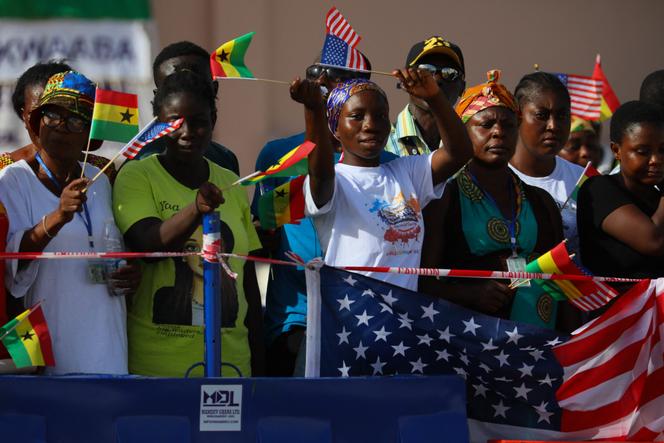


“If Kamala Harris wins, the situation will be bad. If it’s Donald Trump, it will be even worse,” said Daryl Landy, expressing his concern on the eve of the American presidential election, which takes place on Tuesday, November 5. This former teacher from New York moved to Accra, the capital of Ghana, in 2019 to escape what he described as the increasingly overt racism in American society.
Five years later, he’s convinced the situation has worsened. “The people chanting ‘Make America great again’ today want to go back to a time when only one group of people controlled the country,” he said.
Sitting next to him, his friend Wanida Lewis nodded with a serious look on her face. Before launching her business promoting pan-African cuisine in the Accra suburbs, this woman from Maryland on the US East Coast worked for the US government, notably under the Trump administration. “Whatever the outcome of the election, people are going to go crazy. We live in very strange times, where some people don’t want to see their history change and are willing to fight,” she asserted. This situation terrifies Landy who said, “I’m afraid for my family, who are still over there. I really hope they get their passports soon.”
A ‘year of return’ in Ghana
Like Landy and Lewis, many African-Americans have in recent years embarked on a migration movement known as “repatriation,” from the US to the lands of their ancestors, who were deported from West Africa during the slave trade between the 16th and 18th centuries. To encourage their return, the Ghanaian government declared 2019 the “year of return” and set up a program to encourage settlers. Today, this diaspora is estimated to consist of between 10,000 and 15,000 members, according to an estimate by the Association of African Americans in Ghana.
At the many events organized by the association in the run-up to the November 5 presidential election, its president, Diallo Sumbry, admitted to having sensed among his members “a definite excitement about the possibility of having the first African-American woman president.” Especially given that Kamala Harris is well-known in Ghana. The Democratic candidate visited the country in March 2023 during a tour of Africa, which included a visit to Cape Coast Castle, a former hub of the slave trade. There, she praised the “fight for civil rights, fight for justice in the United States of America and around the world,” by the descendants of slaves.
“However, when it comes to politics, the African-American diaspora in Ghana is far from monolithic,” said Sumbry. “Some detest the two-party system, others believe that the presidential institution is itself racist and steeped in white supremacism, while others still believe in the American dream…”
‘The future is here’
Some, like Gary Emerson Fray, have also decided to ignore the ballot and the issues at stake. The 62-year-old New Yorker moved to Ghana two years ago to set up an NGO to help street children and decided not to vote on November 5. The election that counts for him is that of Ghana’s next president, on December 7. “What I face on a daily basis are the effects of Ghana’s failed policies,” he explained. “My interest in what’s going on in the US right now has become very marginal. What really matters to me is the future. And it’s here, in Ghana.”
In the run-up to the US presidential election, the prospect of trying one’s luck in Ghana seems to be appealing to a growing number of African-American citizens. For several months now, Sumbry, who is also the CEO of Adinkra Group, a company that helps with “repatriation,” has been receiving “a lot of calls from people saying they are preparing to leave depending on the outcome of the election, others assure me they will leave the US, regardless of who wins.” The last time he’d seen so many requests was between 2016 and 2020, during Donald Trump’s presidency.

